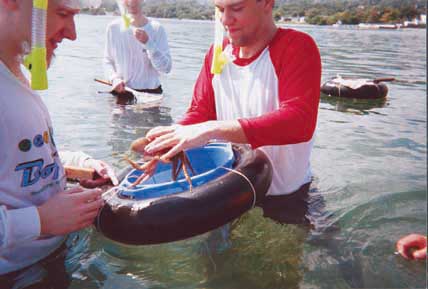
"I ran for the bucket, and when I got back the octopus had wriggled
its tentacles around Nick's arm."

Read about other
Wabash immersion
learning experiences of 2000-2001
Immersion learning experiences are coordinated through the College's
Center for Academic Enrichment
Magazine
Summer/Fall 2001

An Octopus in the Hand
Is Worth Two in the Bucket
It was a warm, starlit night in the ocean shallows near Jamaica's Hofstra
University Marine Laboratory, and Nick Negovetich was scanning the ocean
floor with a flashlight, looking for an octopus.
"If you spot one, grab it with your hands and yell for the bucket,"
the resident instructor of the lab had told the group of eight Wabash
students visiting the station during their spring break. Under the supervision
of biology professors Eric Wetzel and Shivi Selveratnum, the students
were completing field research for their invertebrate and advanced ecology
classes. Negovetich was about to learn a lesson he'll never forget.
"Nick and Mike Robinson spotted this octopus, and Nick pulled it
up just like the instructor said and yelled for the bucket," Professor
Wetzel recalls. "I ran for the bucket, and when I got back the octopus
had wriggled its tentacles around Nick's arm."
"Hey, I think it bit me," the senior biology major said. Wetzel
was nearly there with the bucket.
"Hey, I think it bit me again," Negovetich yelled, flinging
his arm in the air and tossing the cephalopod back to the shallows.
The resident instructor slogged over and snared the escaped octopus with
a net.
"Apparently the 'pick them up by hand' routine was for first-timers,"
Wetzel deduces.
Unharmed, undaunted, and wearing the marks of his attacker with pride,
Negovetich grabbed his flashlight and went in search of another specimen
of the spineless mollusk.
The night hunt was one of the highlights of the group's five-day stay
at the marine lab, which included hiking over and snorkeling under of
mangrove islands and dives to observe and gather a variety of invertebrate
species Funded by the College's Treves Fund as part of the College's strategic
plan initiative to offer as many students as possible immersion learning
experiences, the expedition took the combined classes to an ideal location.
"There's so much bio-diversity there, especially among invertebrates,
" Wetzel explains. "And there were many symbiotic relationships
between the invertebrates my class was studying and the microbes Professor
Selveratnum's class was studying."
"Seeing coral reefs in their natural settings told the students
a lot about these organisms," adds Selveratnum. "This was a
totally different experience than a class lecture could convey."
She recalls senior Nathan Langer peering into the water and rock surfaces,
hunting for various species of algae.
"In this one place, my students saw what happens at each of these
intertidal zones and how these factors impacted algal diversity."
The hands-on nature of the course "is the sort of experience that
gets students excited about the work," Wetzel says. The experience
sometimes molds a student's career choice, as the professor has seen from
previous research trips he's taken with Wabash students to the Mississippi
Gulf
Coast.
Selveratnum noted an important aspect of the trip not related directly
to the students' classwork.
"They saw how people in the Third World live, and some of my students
called this the most important lesson for them," she says. "They
never imagined that a country so close to the U.S. could be so poverty
stricken, or how fortunate they were to be living here."
"This trip consisted mostly of upperclassmen," Wetzel explains.
"The question now is: do you take younger students so that the trip
inspires them for their career at Wabash, or do you use it as a sort of
capstone experience for upper classman."
Selveratnum believes the scales tip in favor of underclassmen.
"With two classes on site, there were numerous opportunities for
students from those different classes to learn from each other. This could
widen and strengthen their interests in biology while they're at Wabash."
"Looking at those factors is part of what we've done since the trip,"
Wetzel concludes. "That's what we'll be exploring as we assess these
sorts of learning experiences and make decisions for the future."
The Jamaica biology excursion was one of many off-campus immersion learning experiences coordinated through the College's Center for Academic Enrichment, a result of the College's strategic plan.
Return to the table of contents
